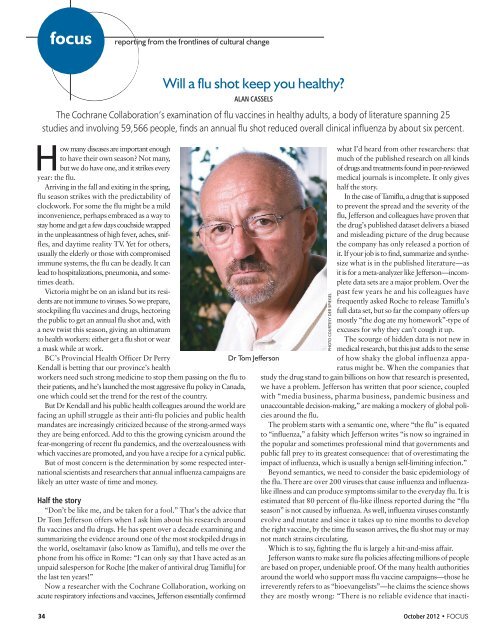**October 2012 Focus - Focus Magazine
**October 2012 Focus - Focus Magazine
**October 2012 Focus - Focus Magazine
Create successful ePaper yourself
Turn your PDF publications into a flip-book with our unique Google optimized e-Paper software.
focus reporting from the frontlines of cultural change<br />
How many diseases are important enough<br />
to have their own season? Not many,<br />
but we do have one, and it strikes every<br />
year: the flu.<br />
Arriving in the fall and exiting in the spring,<br />
flu season strikes with the predictability of<br />
clockwork. For some the flu might be a mild<br />
inconvenience, perhaps embraced as a way to<br />
stay home and get a few days couchside wrapped<br />
in the unpleasantness of high fever, aches, sniffles,<br />
and daytime reality TV. Yet for others,<br />
usually the elderly or those with compromised<br />
immune systems, the flu can be deadly. It can<br />
lead to hospitalizations, pneumonia, and sometimes<br />
death.<br />
Victoria might be on an island but its residents<br />
are not immune to viruses. So we prepare,<br />
stockpiling flu vaccines and drugs, hectoring<br />
the public to get an annual flu shot and, with<br />
a new twist this season, giving an ultimatum<br />
to health workers: either get a flu shot or wear<br />
a mask while at work.<br />
BC’s Provincial Health Officer Dr Perry<br />
Kendall is betting that our province’s health<br />
workers need such strong medicine to stop them passing on the flu to<br />
their patients, and he’s launched the most aggressive flu policy in Canada,<br />
one which could set the trend for the rest of the country.<br />
But Dr Kendall and his public health colleagues around the world are<br />
facing an uphill struggle as their anti-flu policies and public health<br />
mandates are increasingly criticized because of the strong-armed ways<br />
they are being enforced. Add to this the growing cynicism around the<br />
fear-mongering of recent flu pandemics, and the overzealousness with<br />
which vaccines are promoted, and you have a recipe for a cynical public.<br />
But of most concern is the determination by some respected international<br />
scientists and researchers that annual influenza campaigns are<br />
likely an utter waste of time and money.<br />
Half the story<br />
“Don’t be like me, and be taken for a fool.” That’s the advice that<br />
Dr Tom Jefferson offers when I ask him about his research around<br />
flu vaccines and flu drugs. He has spent over a decade examining and<br />
summarizing the evidence around one of the most stockpiled drugs in<br />
the world, oseltamavir (also know as Tamiflu), and tells me over the<br />
phone from his office in Rome: “I can only say that I have acted as an<br />
unpaid salesperson for Roche [the maker of antiviral drug Tamiflu] for<br />
the last ten years!”<br />
Now a researcher with the Cochrane Collaboration, working on<br />
acute respiratory infections and vaccines, Jefferson essentially confirmed<br />
Will a flu shot keep you healthy?<br />
ALAN CASSELS<br />
The Cochrane Collaboration’s examination of flu vaccines in healthy adults, a body of literature spanning 25<br />
studies and involving 59,566 people, finds an annual flu shot reduced overall clinical influenza by about six percent.<br />
Dr Tom Jefferson<br />
what I’d heard from other researchers: that<br />
much of the published research on all kinds<br />
of drugs and treatments found in peer-reviewed<br />
medical journals is incomplete. It only gives<br />
half the story.<br />
In the case of Tamiflu, a drug that is supposed<br />
to prevent the spread and the severity of the<br />
flu, Jefferson and colleagues have proven that<br />
the drug’s published dataset delivers a biased<br />
and misleading picture of the drug because<br />
the company has only released a portion of<br />
it. If your job is to find, summarize and synthesize<br />
what is in the published literature—as<br />
it is for a meta-analyzer like Jefferson—incomplete<br />
data sets are a major problem. Over the<br />
past few years he and his colleagues have<br />
frequently asked Roche to release Tamiflu’s<br />
full data set, but so far the company offers up<br />
mostly “the dog ate my homework”-type of<br />
excuses for why they can’t cough it up.<br />
The scourge of hidden data is not new in<br />
medical research, but this just adds to the sense<br />
of how shaky the global influenza apparatus<br />
might be. When the companies that<br />
study the drug stand to gain billions on how that research is presented,<br />
we have a problem. Jefferson has written that poor science, coupled<br />
with “media business, pharma business, pandemic business and<br />
unaccountable decision-making,” are making a mockery of global policies<br />
around the flu.<br />
The problem starts with a semantic one, where “the flu” is equated<br />
to “influenza,” a falsity which Jefferson writes “is now so ingrained in<br />
the popular and sometimes professional mind that governments and<br />
public fall prey to its greatest consequence: that of overestimating the<br />
impact of influenza, which is usually a benign self-limiting infection.”<br />
Beyond semantics, we need to consider the basic epidemiology of<br />
the flu. There are over 200 viruses that cause influenza and influenzalike<br />
illness and can produce symptoms similar to the everyday flu. It is<br />
estimated that 80 percent of flu-like illness reported during the “flu<br />
season” is not caused by influenza. As well, influenza viruses constantly<br />
evolve and mutate and since it takes up to nine months to develop<br />
the right vaccine, by the time flu season arrives, the flu shot may or may<br />
not match strains circulating.<br />
Which is to say, fighting the flu is largely a hit-and-miss affair.<br />
Jefferson wants to make sure flu policies affecting millions of people<br />
are based on proper, undeniable proof. Of the many health authorities<br />
around the world who support mass flu vaccine campaigns—those he<br />
irreverently refers to as “bioevangelists”—he claims the science shows<br />
they are mostly wrong: “There is no reliable evidence that inacti-<br />
34 October <strong>2012</strong> • FOCUS<br />
PHOTO COURTESY DER SPIEGEL
















